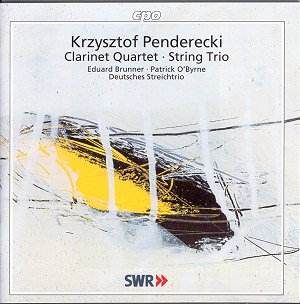Krzysztof
PENDERECKI (born
1933)
Chamber Works.
String Trio. Prelude for Solo Clarinet. Per Slava. Violin Sonata. Cadenza
for Solo Viola. Clarinet Quartet.
 Edward Brunner
(clarinet); Deutsches Streichtrio; Patrick O'Byrne (piano).
Edward Brunner
(clarinet); Deutsches Streichtrio; Patrick O'Byrne (piano).
Recorded April 1992 (string trio), rest December 1997-January 1998, all South
West German Radio Studio.
 CPO 999 730-2
[48'12]
CPO 999 730-2
[48'12]
Crotchet AmazonUK
AmazonUS

Although most of the works on this disc fall into the period 1984-93, it
also includes Penderecki's 'earliest' composition, the Violin Sonata (1953,
completed the year before entering the Cracow Music Academy). The figure
of Bartók looms over the first two movements, with Prokofiev in the
shadows in the first. There is an abundance of energy in the initial Allegro,
with the ghostly stillness of the second providing contrast. Neither can
fully work out their potentials (they last 2'59 and 2'32 respectively), but
the equally brief finale gives both players an opportunity to let their hair
down.
The Deutsches Streichtrio's account of the String Trio (1990/1) reveals the
bleak atmosphere behind the stark, bare harmonies of the first movement.
The Vivace, fugal in intent, is performed with great verve. The 1987 Prelude
for Solo Clarinet introduces the clarinettist Edward Brunner to the
proceedings. It was written for the composer Paul Patterson and is a hugely
enjoyable, expressive piece given a most convincing reading by Brunner. Per
Slava ('Slava' being the nickname of its dedicatee, Mstislav Rostropovich)
dates from 1986 and displays a larger range of textures and emotions, exploiting
the technical possibilities of the instrument fully. The cellist of the Deutsches
Streichtrio, Rainer Ginzel, gives an impressive reading, the climactic chords
receiving their full weight.
It could be argued that seven minutes is a long time to spend with a solo
viola, but Penderecki sustains his musical argument well. This is technically
a very difficult piece, although it holds few perils for Jürgen Weber:
the high harmonics near the end are impeccably placed.
The Clarinet Quartet may come as a revelation if you don't know it. It is
a work of much substance, three brief movements moving towards a final movement
entitled Abschied (Farewell). The desolate textures of the
Notturno draw the listener in to what is obviously a very private
world. And a somewhat shadowy one: the third movement is a dreamy recollection
of a Waltz. The mood of the first movement returns, intensified, for the
six and a half minute finale. The fragmentary gestures conjure up a chilly
surface devoid of warmth leading to a still, calm ending. Memorable.
Issued at medium price, this is a competitive disc that more than holds its
own against Wergo's similar compilation (String Trio, Violin Sonata, Per
Slava, Cadenza with the bonus of String Quartets Nos. 1 and 2,
Wergo WER6258-2). If you are remotely intrigued, you will not regret the
outlay.
Colin Clarke

